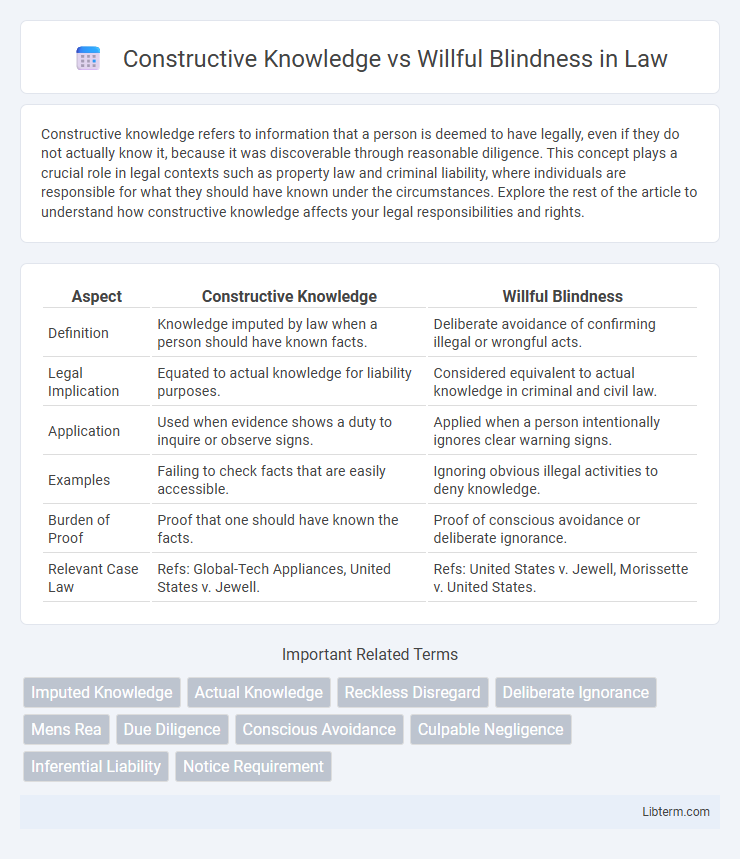Constructive knowledge refers to information that a person is deemed to have legally, even if they do not actually know it, because it was discoverable through reasonable diligence. This concept plays a crucial role in legal contexts such as property law and criminal liability, where individuals are responsible for what they should have known under the circumstances. Explore the rest of the article to understand how constructive knowledge affects your legal responsibilities and rights.
Table of Comparison
| Aspect | Constructive Knowledge | Willful Blindness |
|---|---|---|
| Definition | Knowledge imputed by law when a person should have known facts. | Deliberate avoidance of confirming illegal or wrongful acts. |
| Legal Implication | Equated to actual knowledge for liability purposes. | Considered equivalent to actual knowledge in criminal and civil law. |
| Application | Used when evidence shows a duty to inquire or observe signs. | Applied when a person intentionally ignores clear warning signs. |
| Examples | Failing to check facts that are easily accessible. | Ignoring obvious illegal activities to deny knowledge. |
| Burden of Proof | Proof that one should have known the facts. | Proof of conscious avoidance or deliberate ignorance. |
| Relevant Case Law | Refs: Global-Tech Appliances, United States v. Jewell. | Refs: United States v. Jewell, Morissette v. United States. |
Introduction to Constructive Knowledge and Willful Blindness
Constructive knowledge refers to information that a person should have known, based on reasonable diligence, even if they did not have actual awareness. Willful blindness occurs when an individual intentionally avoids acquiring knowledge to escape liability or responsibility. Understanding these concepts is essential in legal contexts where proving intent or knowledge impacts the outcome of cases.
Defining Constructive Knowledge in Legal Context
Constructive knowledge in the legal context refers to information that a person or entity is presumed to know because it was accessible through reasonable inquiry or due diligence. This legal doctrine holds individuals accountable for information they should have discovered, even if they did not have actual awareness, underscoring the standard of reasonable knowledge. Constructive knowledge contrasts with willful blindness, where a person deliberately avoids acquiring certain knowledge to evade liability.
Understanding Willful Blindness: Meaning and Scope
Willful blindness refers to the deliberate avoidance of acquiring knowledge about facts or details that would reveal wrongdoing or unethical behavior. This concept extends beyond mere ignorance, highlighting intentional efforts to remain uninformed despite clear indications that critical information exists. Understanding willful blindness involves recognizing how individuals or organizations consciously choose to ignore evidence, thereby complicating accountability and ethical responsibility.
Key Differences Between Constructive Knowledge and Willful Blindness
Constructive knowledge refers to information that a person should have reasonably known based on the circumstances, implying an obligation to inquire or investigate further. Willful blindness occurs when an individual intentionally avoids confirming a fact or truth to escape liability or responsibility. The key difference lies in the intent: constructive knowledge involves negligence in obtaining information, whereas willful blindness involves deliberate avoidance of knowledge.
Legal Precedents: Landmark Cases and Interpretations
Legal precedents distinguish constructive knowledge as awareness that a person should have had based on the circumstances, while willful blindness involves deliberately avoiding certain knowledge to evade liability. Landmark cases such as *Global-Tech Appliances, Inc. v. SEB S.A.* have clarified that willful blindness satisfies the knowledge requirement when a defendant intentionally ignores clear evidence. Courts interpret constructive knowledge to imply negligence, whereas willful blindness equates to intentional avoidance of truth, influencing judgments in criminal and civil law.
Practical Examples: Constructive Knowledge vs Willful Blindness
Constructive knowledge occurs when an individual is expected to know a fact because it was discoverable through reasonable investigation, such as a manager ignoring visible signs of financial fraud in company accounts. Willful blindness arises when a person deliberately avoids acquiring knowledge to escape responsibility, like a real estate agent ignoring defects in a property during a sale. Both concepts impact legal liability by distinguishing between negligent ignorance and intentional avoidance of the truth.
Implications for Corporations and Individuals
Constructive knowledge in corporations implies awareness of illegal or unethical activities through deliberate avoidance, triggering legal liability similar to actual knowledge. Willful blindness, where individuals intentionally ignore wrongdoing, increases exposure to regulatory penalties and damages reputational trust for both employees and organizations. Understanding these concepts is critical for compliance programs, as they emphasize proactive monitoring and accountability to mitigate risks associated with knowledge gaps.
Role in Criminal vs Civil Liability
Constructive knowledge implies a legal standard where a person should have known a fact based on the circumstances, often leading to liability in both criminal and civil cases by establishing negligence or recklessness. Willful blindness occurs when an individual deliberately avoids confirming a fact to escape liability, which courts often treat as equivalent to actual knowledge, increasing culpability in criminal prosecutions and influencing civil judgments. The distinction impacts the burden of proof and the severity of penalties, with constructive knowledge emphasizing objective foreseeability and willful blindness focusing on subjective intent to evade awareness.
Preventing Liability: Compliance and Training Strategies
Preventing liability related to constructive knowledge and willful blindness hinges on robust compliance programs and employee training that emphasize ethical decision-making and legal awareness. Implementing systematic monitoring, clear reporting mechanisms, and regular audits ensures organizations identify and address potential risks proactively. Training instills a culture of accountability, reducing instances where employees deliberately ignore illegal activities or fail to investigate suspicious behavior.
Conclusion: Navigating Knowledge and Accountability
Navigating the boundary between constructive knowledge and willful blindness is crucial for establishing legal accountability and ethical responsibility in business and law. Understanding that constructive knowledge implies awareness of facts that one should have known, while willful blindness represents deliberate ignorance, helps courts assign liability accurately. Clear distinctions between these concepts ensure organizations implement proper compliance measures and avoid intentional ignorance to prevent legal repercussions.
Constructive Knowledge Infographic

 libterm.com
libterm.com